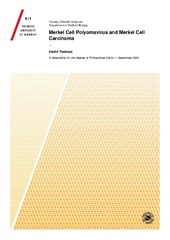Blar i forfatter "Rasheed, Kashif"
-
CCL17/TARC and CCR4 expression in Merkel cell carcinoma
Rasheed, Kashif; Abdulsalam, Ibrahim Afolabi; Fismen, Silje; Grimstad, Øystein; Sveinbjørnsson, Baldur; Moens, Ugo (Journal article; Tidsskriftartikkel; Peer reviewed, 2018-07-31)Merkel cell carcinoma (MCC) is a rare, highly aggressive neuroendocrine skin cancer. In more than 80% of the cases, Merkel cell polyomavirus (MCPyV) is a causal factor. The oncogenic potential of MCPyV is mediated through its viral oncoproteins, large T antigen (LT) and small t antigen (sT). To investigate the role of cytokines in MCC, a PCR array analysis for genes encoding inflammatory cytokines ... -
Functional analyses of rare germline BRCA1 variants by transcriptional activation and homologous recombination repair assays
Bassi, Nicola; Hovland, Henrikke Nilsen; Rasheed, Kashif; Ghelue, Marijke van (Journal article; Tidsskriftartikkel; Peer reviewed, 2023-04-21)Background - Damaging alterations in the BRCA1 gene have been extensively described as one of the main causes of hereditary breast and ovarian cancer (HBOC). BRCA1 alterations can lead to impaired homologous recombination repair (HRR) of double-stranded DNA breaks, a process which involves the RING, BRCT and coiled-coil domains of the BRCA1 protein. In addition, the BRCA1 protein is involved in ... -
MCPyV Large T antigen induced atonal homolog 1 (ATOH1) is a lineage-dependency oncogene in Merkel cell carcinoma.
Fan, Kaiji; Gravemeyer, Jan; Ritter, Cathrin; Rasheed, Kashif; Gambichler, Thilo; Moens, Ugo Lionel; Shuda, Masahiro; Schrama, David; Becker, Jürgen C. (Journal article; Tidsskriftartikkel; Peer reviewed, 2019-07-07)Despite the fact that the transcription factor ATOH1 is a master regulator of Merkel cell development, its role in Merkel cell carcinoma (MCC) carcinogenesis remains controversial. Here, we provide several lines of evidence that ATOH1 is a lineage-dependent oncogene in MCC. Luciferase assays revealed binding of ATOH1 and subsequent activation to the promoter of miR-375, which is one of the most ... -
Merkel Cell Polyomavirus and Merkel Cell Carcinoma
Rasheed, Kashif (Doctoral thesis; Doktorgradsavhandling, 2020-09-04)Merkel cell carcinoma (MCC) is a rare, highly aggressive neuroendocrine skin cancer. More than 80% of MCC have Merkel cell polyomavirus (MCPyV) clonally integrated into the human genome (VP-MCC) while the remaining 20% are virus negative (VN-MCC) but linked with chronic exposure to UV sunlight. MCC is particularly associated with immune suppression with 8-48 folds increase in incidence in immunosuppressive ... -
Merkel cell polyomavirus and non-Merkel cell carcinomas: Guilty or circumstantial evidence?
Csoboz, Balint; Rasheed, Kashif; Sveinbjørnsson, Baldur; Moens, Ugo (Journal article; Tidsskriftartikkel; Peer reviewed, 2020-01-28)Merkel cell polyomavirus (MCPyV) is the major causative factor of the rare but aggressive cancer, Merkel cell carcinoma (MCC). Two characteristics of MCPyV‐positive MCCs are integration of the viral genome and expression of a truncated version of one of its oncogenic proteins, namely large T antigen. The strong association of MCPyV with MCC development has incited researchers to further investigate ... -
The Merkel Cell Polyomavirus T-Antigens and IL-33/ST2-IL1RAcP Axis: Possible Role in Merkel Cell Carcinoma
Rasheed, Kashif; Moens, Ugo; policastro, benedetta; Johnsen, John Inge; Koljonen, Virve; Sihto, Harri; Lui, Weng-Onn; Sveinbjørnsson, Baldur (Journal article; Tidsskriftartikkel; Peer reviewed, 2022-03-28)Merkel cell polyomavirus (MCPyV) is a causal factor in Merkel cell carcinoma (MCC). The oncogenic potential is mediated through its viral oncoproteins large T-antigen (LT) and small T-antigen (sT). Cytokines produced by tumor cells play an important role in cancer pathogenesis, and viruses affect their expression. Therefore, we compared human cytokine and receptor transcript levels in virus ... -
Promoter activity of Merkel cell Polyomavirus variants in human dermal fibroblasts and a Merkel cell carcinoma cell line.
Abdulsalam, Ibrahim Afolabi; Rasheed, Kashif; Sveinbjørnsson, Baldur; Ehlers, Bernhard; Moens, Ugo (Journal article; Tidsskriftartikkel; Peer reviewed, 2020-04-19)<p><i>Background - </i>Merkel cell polyomavirus (MCPyV) is a human polyomavirus that establishes a life-long harmless infection in most individuals, with dermal fibroblasts believed to be the natural host cell. However, this virus is the major cause of Merkel cell carcinoma (MCC), an aggressive skin cancer. Several MCPyV variants with polymorphism in their promoter region have been isolated, but it ... -
Reciprocal transactivation of Merkel cell polyomavirus and high-risk human papillomavirus promoter activities and increased expression of their oncoproteins
Rasheed, Kashif; Sveinbjørnsson, Baldur; Moens, Ugo (Journal article; Tidsskriftartikkel; Peer reviewed, 2021-07-03)<i>Background</i> - Approximately 15% of human cancers are attributed to viruses. Numerous studies have shown that high-risk human polyomaviruses (HR-HPV) and Merkel cell polyomavirus (MCPyV) are two human tumor viruses associated with anogenetal and oropharyngeal cancers, and with Merkel cell carcinoma, respectively. MCPyV has been found in HR-HPV positive anogenetal and oropharyngeal tumors, ... -
The role of Merkel cell polyomavirus and other human polyomaviruses in emerging hallmarks of cancer
Moens, Ugo; Rasheed, Kashif; Abdulsalam, Ibrahim; Sveinbjørnsson, Baldur (Journal article; Tidsskriftartikkel; Peer reviewed, 2015-04-10)Polyomaviruses are non-enveloped, dsDNA viruses that are common in mammals, including humans. All polyomaviruses encode the large T-antigen and small t-antigen proteins that share conserved functional domains, comprising binding motifs for the tumor suppressors pRb and p53, and for protein phosphatase 2A, respectively. At present, 13 different human polyomaviruses are known, and for some of them ...


 English
English norsk
norsk







